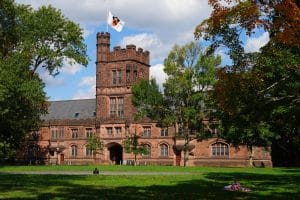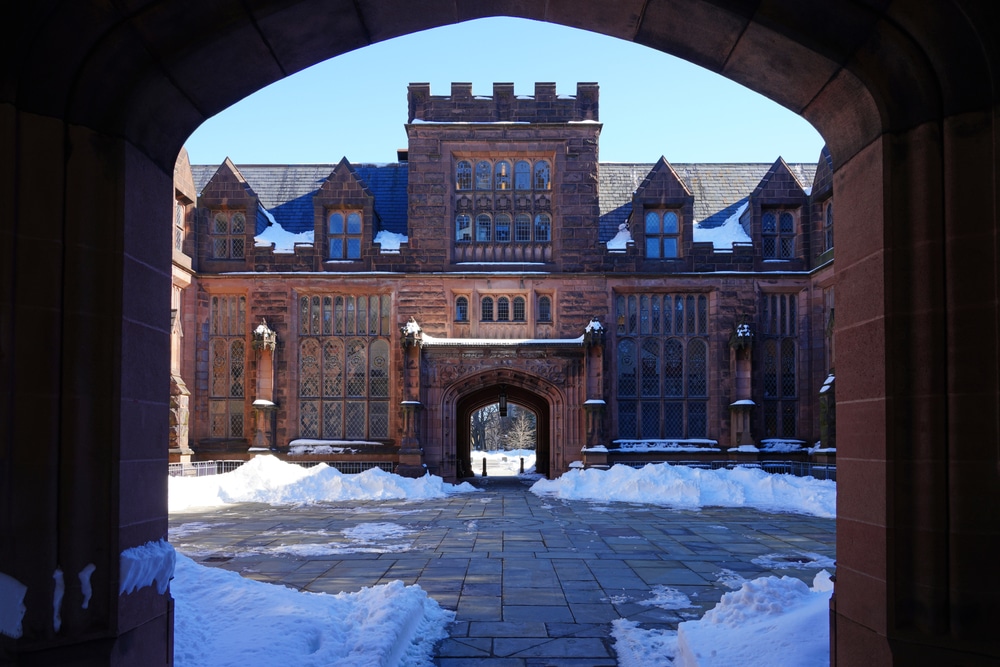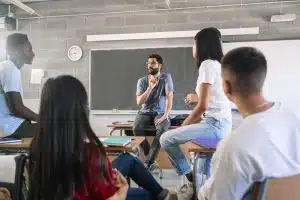The Public Lectures at Princeton University
Welcome to our exploration of the Public Lectures at Princeton University, a series of events that open the doors to a world of knowledge and insight. These lectures, free and accessible to all, are not just talks but gateways to understanding diverse topics ranging from the complexities of science and technology to the depths of politics and the arts.
At Princeton, these lectures form an integral part of the university’s tradition, offering students and the wider community a chance to engage with leading thinkers, scholars, and experts. Whether you’re a prospective student dreaming of joining Princeton’s vibrant community or simply someone with a thirst for knowledge, these lectures are a valuable resource.
In this blog, we’ll take a closer look at the Public Lectures at Princeton: their history, the wide range of topics they cover, notable past speakers, and their impact on student life and learning. Join us as we delve into how these lectures enrich the academic experience at Princeton and how they reflect the university’s commitment to fostering a culture of intellectual curiosity and lifelong learning.
What are the Princeton Public Lectures?
Princeton University Public Lectures represent a significant aspect of the academic and cultural life at Princeton University. These lectures are a series of talks and presentations given by distinguished speakers from various fields, including academia, politics, arts, and science. The aim of these lectures is to provide the university community, as well as the general public, with opportunities to hear from and engage with leading thinkers and practitioners from around the world.
The lectures cover a wide range of topics, reflecting the diverse interests and academic pursuits at Princeton. They can range from discussions on contemporary political issues, scientific discoveries, historical analyses, and artistic performances, to insights into economic trends and technological advancements. This variety ensures that there is something of interest for everyone, making these lectures an essential part of intellectual life both on and off-campus.
One of the unique features of the Princeton University Public Lectures is their accessibility. These events are typically free and open to the public, making them an invaluable resource not only for Princeton students and faculty but also for the wider community. This openness is a testament to the university’s commitment to sharing knowledge and fostering a broader understanding of complex issues facing society.
Additionally, these lectures often provide a platform for interaction between the audience and the speaker. Question and answer sessions are common, allowing attendees to delve deeper into the subjects presented and engage directly with the experts. This interactive aspect of the lectures enhances the learning experience, providing a more dynamic and engaging environment compared to traditional academic settings.
For students aspiring to attend Princeton, these lectures offer a glimpse into the kind of intellectual environment they can expect at the university. Attending these lectures can provide prospective students with a sense of the academic rigor and the breadth of subjects explored at Princeton. It also demonstrates the university’s commitment to fostering an environment where learning extends beyond the classroom.
In addition to benefiting current and prospective students, the Princeton University Public Lectures also serve as a valuable resource for researchers and academics. The lectures often touch on cutting-edge topics and present new research findings, making them a source of inspiration and information for ongoing academic work. They can also serve as a networking opportunity, allowing academics to connect with other professionals in their field.
The Princeton University Public Lectures are not only about sharing knowledge but also about inspiring the next generation of leaders, thinkers, and innovators. By exposing attendees to a wide array of subjects and viewpoints, these lectures encourage critical thinking and a deeper understanding of the complex issues facing the world today. They challenge attendees to think creatively and to approach problems from different perspectives.
Moreover, the lectures contribute to the cultural vibrancy of the Princeton community. They are often accompanied by related events such as exhibitions, performances, and workshops, which provide additional opportunities for engagement and learning. These ancillary events enhance the overall experience of the lecture series, making it a comprehensive educational and cultural experience.
Where Do the Public Lectures Take Place?
The Princeton Public Lectures typically take place at various locations across the campus. These locations are chosen based on the expected audience size, the nature of the lecture, and the availability of suitable venues. Some of the common venues for these lectures include major auditoriums, lecture halls, and sometimes outdoor spaces for larger or special events.
One of the primary venues for these lectures is the renowned McCosh Hall, known for its historical significance and architectural beauty. McCosh Hall, with its large seating capacity and central location on campus, is an ideal setting for lectures that attract a significant number of attendees. The hall’s atmosphere contributes to the academic and intellectual ambiance of the lectures, providing an environment that is both inspiring and conducive to learning.

Another frequently used venue is the Richardson Auditorium, located in Alexander Hall. This venue is known for its excellent acoustics and elegant interior, making it a preferred choice for lectures that involve musical performances or require high-quality sound systems. Richardson Auditorium’s comfortable seating and aesthetic appeal add to the overall experience of attending a public lecture at Princeton.
For more specialized lectures, particularly those involving smaller, more intimate gatherings or interactive sessions, smaller venues such as seminar rooms or departmental lecture halls are often utilized. These settings provide a more personal and engaging atmosphere, allowing for closer interaction between the speaker and the audience.
In addition to indoor venues, Princeton University sometimes hosts public lectures in outdoor spaces, particularly for events that coincide with other campus activities or during favorable weather conditions. These outdoor events offer a unique and relaxed environment, different from the traditional lecture hall setting.
The specific location for each public lecture is carefully selected to enhance the overall experience of the lecture. Details about the venue, including its location, accessibility, and seating capacity, are usually provided in the announcement of each lecture. This information can be found on the Princeton University Public Lectures website, where attendees can also find directions, parking information, and other logistical details.
Moreover, for those unable to attend in person, Princeton University often provides the option to participate virtually. This is typically done through live streaming or recording the lectures for later viewing, making the lectures accessible to a global audience. This digital access ensures that the valuable insights shared in these lectures are not limited to just those who can physically attend.
The History of the Public Lectures
These lectures have been an integral part of Princeton’s academic and cultural landscape, bringing together intellectuals, academics, artists, and writers from various fields.
The inception of these public lectures can be traced back to the late 19th and early 20th centuries, marked by the establishment of several significant lecture series. The Spencer Trask Lecture Series, initiated in 1891 with a gift from Spencer Trask of the Class of 1866, focused on topics of current philosophical, artistic, or scientific interest. This series has hosted luminaries like T. S. Eliot and Bertrand Russell.
Similarly, the Stafford Little Lecture Series, founded in 1899 through a gift from Stafford Little of the Class of 1844, originally intended to feature former President Grover Cleveland. After his death, the series expanded to include other eminent figures like Albert Einstein and Thurgood Marshall. The Louis Clark Vanuxem Lecture Series, begun in 1912, and the J. Edward Farnum Lecture Series, established in 1939, further diversified the range of topics and speakers, featuring experts like Alfred N. Whitehead and Tony Kushner.
The Walter E. Edge Lecture Series, named after Walter E. Edge, Class of 1946 and former Governor of New Jersey, started in 1957. This series aimed to bring international statesmen and leaders in American public life to Princeton, with speakers like Elie Wiesel and Ruth Bader Ginsburg gracing the stage.
The impact of these lectures extends beyond the confines of the university, offering a virtual front-row seat to cutting-edge discussions and performances. The lectures cover a broad spectrum of topics, ranging from political and social issues to economic and artistic themes. This wide-ranging content is not only significant for the Princeton community but also for the global audience, as it fosters a deeper understanding of various subjects and encourages intellectual engagement.
Moreover, Princeton’s commitment to making these lectures accessible to a broader audience is evident in their digital initiatives. The university has converted numerous public lectures into digital formats, such as podcasts, allowing easy access for anyone interested, regardless of their geographical location. This move towards digitalization aligns with Princeton’s goal of sharing knowledge and insights on a global scale.
Diverse Topics and Disciplines
These lectures, spanning from technology and natural sciences to the humanities and social sciences, provide insights into cutting-edge research and contemporary issues, drawing from the expertise of both Princeton faculty and renowned global intellectuals.
In technology and natural sciences, recent lectures have delved into topics like differential privacy, as evidenced by Cynthia Dwork’s lecture last December 7, 2023. This indicates a focus on current and relevant technological issues, particularly those intersecting with societal impact.
The humanities are equally represented in the Princeton Talks initiative, a series of short, informal presentations by university faculty. This platform features diverse perspectives from various departments, including Art & Archaeology, Sociology, American Studies, Music, and History. For instance, Basile Baudez from the Department of Art & Archaeology, and Sarah Rivett from the English and American Studies departments, have been featured, showcasing the wide-ranging interests and expertise within the university.
Furthermore, the archive of past talks provides a window into the diversity of subjects covered in these lectures. Topics range from economic and legal issues, as discussed by Alan Blinder and Laura Edwards, to astrophysics and environmental justice, as explored by Gáspár Bakos and Rob Nixon. Such diversity not only enriches the academic environment at Princeton but also offers the public access to a wealth of knowledge across disciplines.
This broad array of topics underlines Princeton’s dedication to fostering a culture of comprehensive learning and intellectual curiosity. By bringing together speakers from varied fields, the public lecture series at Princeton University plays a crucial role in promoting interdisciplinary dialogue and enhancing the educational experience for both students and the wider community.
Why You Should Attend the Princeton Public Lectures
Attending the Public Lectures at Princeton offers numerous benefits. These lectures are a rare opportunity to gain insights from world-renowned experts in various fields, including science, politics, arts, and humanities. The diversity of topics ensures that there is something of interest for everyone, making these events a rich source of knowledge and inspiration.
One of the main reasons to attend these lectures is the access to cutting-edge research and innovative ideas. Speakers often present new findings or perspectives that are not yet widely available, giving attendees a glimpse into the latest developments in various disciplines. For students and academics, this can be particularly valuable, providing a deeper understanding of their fields of study and sparking new ideas for research or study.
Additionally, these lectures can serve as a significant networking opportunity. They attract a diverse audience, including students, faculty, and professionals from various industries. This makes them an excellent platform for meeting people with similar interests, exchanging ideas, and building professional relationships.
For those considering applying to Princeton or other prestigious universities, attending these lectures can also provide a sense of the academic environment and expectations at such institutions. It offers a glimpse into the level of discourse and the kind of intellectual community they might join, which can be both motivating and informative for their application process.
Furthermore, these lectures contribute to personal development by challenging attendees to think critically and approach complex issues from multiple perspectives. The range of topics and the depth of discussion encourage a broader understanding of the world and foster a sense of global citizenship.
How Long Do the Public Lectures Usually Last?
The duration typically varies depending on the nature of the topic, the format of the lecture, and the speaker’s presentation style. However, most of these lectures are designed to fit within a timeframe that is conducive to audience engagement and intellectual absorption, balancing the depth of content with the practical considerations of time.
Generally, a standard Princeton University Public Lecture lasts about one to two hours. This duration is considered optimal for covering a topic in sufficient depth without overwhelming the audience. Within this timeframe, a lecture often includes a presentation by the speaker, followed by a question-and-answer session. The presentation portion usually lasts between 45 minutes to an hour, allowing the speaker to delve into the subject matter comprehensively.
The question-and-answer session that typically follows the presentation is an integral part of the lecture experience at Princeton. It usually lasts around 15 to 30 minutes, depending on the engagement level of the audience and the complexity of the topics discussed. This session provides an opportunity for attendees to seek clarification, explore additional aspects of the topic, and engage directly with the speaker. It enhances the interactive nature of the lectures and allows for a broader exploration of the subject.
It’s important to note that some special lectures or series may have different durations. For example, lectures that are part of a larger series or those featuring multiple speakers might extend beyond the typical one to two hours. Similarly, events that include additional components, such as panel discussions, performances, or receptions, can also have longer durations. In such cases, the extended time allows for a more comprehensive exploration of the topic and facilitates greater interaction and engagement among the speakers and the audience.
Princeton University ensures that information about the duration of each lecture, along with the schedule and other details, is clearly communicated in advance. This information can be found on the university’s public lectures website, in the event announcements, and in the communications sent to registered or interested attendees. Being aware of the lecture duration helps attendees plan their visit effectively, ensuring a comfortable and enriching experience.
Moreover, for the convenience of those who cannot commit to attending the entire duration of a lecture or who have scheduling conflicts, Princeton often provides options for remote participation. This can include live streaming of the lectures or making recordings available for viewing at a later time. These options allow a wider audience to benefit from the lectures, regardless of their ability to attend in person or their time constraints.
How Hard Is it to Get Into the Princeton Public Lectures
It is important to note that most of these lectures do not require a formal application process. The primary requirement is an interest in the lecture’s topic. Princeton University, recognizing the value of making educational resources available to a wider audience, typically offers these lectures free of charge.
In cases where seating is limited due to the popularity of a lecture or the capacity of the venue, the university might require attendees to reserve a seat in advance. This reservation process is typically straightforward, often involving a simple online form available on the lecture’s webpage. The form usually asks for basic information like name and contact details, and confirmation is generally provided via email. This reservation process is designed to be as user-friendly as possible to accommodate a diverse audience.
The atmosphere at these lectures is typically welcoming and inclusive. Princeton aims to create an environment where attendees feel comfortable and are encouraged to engage with the content. When the format of the lecture allows, there are often opportunities for attendees to participate in question-and-answer sessions, enhancing the interactive and engaging nature of these events.
How to Apply to the Princeton Public Lectures
Check the Schedule and Register Online: Princeton University Public Lectures are listed on their official website, which provides a comprehensive schedule of upcoming lectures. Interested individuals should regularly check this website for updates on new lectures and events. Most lectures require registration, which can typically be done online through the website. Registering in advance is crucial as it secures a spot in the lecture, especially for popular topics or well-known speakers, where demand may be high.
Open to the Public and Free of Charge: One of the most appealing aspects of the Princeton University Public Lectures is that they are open to the public and free of charge. This inclusivity ensures that everyone, regardless of their affiliation with the university, has the opportunity to attend. It’s important to note, however, that while the lectures are free, some might have limited seating capacity, making early registration or arrival essential.
Attend Virtually When Available: Princeton University occasionally offers virtual access to their public lectures. This is especially useful for those who cannot physically attend due to geographical constraints or other commitments. Checking the lecture series website for virtual attendance options and registering for online access when available is a convenient way to participate.
Follow Email Updates for New Lectures: Subscribing to email updates from the Princeton University Public Lectures website is a proactive way to stay informed about upcoming lectures. Subscribers receive notifications about new lectures, registration openings, and any changes to the schedule, ensuring they never miss an opportunity to attend a lecture of interest.
Arrive Early for On-Site Lectures: For on-site lectures, it’s advisable to arrive early. This not only ensures a good seat but also allows time to navigate the campus if you’re unfamiliar with it. On-site lectures may also offer additional experiences, like Q&A sessions with the speaker or post-lecture discussions, which are valuable for deeper engagement with the topic.
Engage in Post-Lecture Activities: Often, lectures at Princeton are accompanied by additional activities such as panel discussions, workshops, or informal meet-and-greet sessions with the speaker. Engaging in these activities can enhance the overall experience, offering deeper insights into the lecture topic and additional networking opportunities with fellow attendees and experts in the field.
Are There Any Application Deadlines?
The lectures typically do not require a formal application process, and hence there are usually no strict deadlines for applying to attend these events. However, for lectures that are exceptionally popular or have limited seating, there might be a need to reserve a seat in advance.
In such cases, any deadlines for reservation would be clearly stated on the event’s webpage or in the announcement materials. It’s advisable to regularly check the Princeton University Public Lectures website for the most up-to-date information on upcoming lectures and any specific reservation requirements they might have.
How to Reserve Seats for the Public Lectures
Reserving seats for Princeton University Public Lectures typically involves a straightforward online process. If a particular lecture requires seat reservations due to high demand or limited space, this information is usually provided on the event’s webpage.
The reservation process generally includes filling out an online form, available on the lecture’s webpage, where you would provide basic personal information such as your name and contact details. Confirmation of your reservation is then sent to you, usually via email. It is important to check the specific lecture’s webpage for detailed instructions and to complete this process well in advance of the event, as seats can fill up quickly.
2023’s Public Lecture Series
Here is an overview of the lectures that happened this year. Remember, as a student, each of these lectures offered unique insights and opportunities to expand your knowledge and understanding of various subjects.
1. Cynthia Dwork’s Lecture on Differential Privacy (Dec 7, 2023): In this lecture titled “It’s in Your Phone. It’s in Your Browser. It’s in Your Redistricting Data! … It’s Differential Privacy,” Cynthia Dwork, a prominent computer scientist, discussed the critical role of differential privacy in modern technology. You would have gained an understanding of how privacy is maintained in everyday devices and online platforms, a topic increasingly relevant in our digital age.
2. Dr. Fei-Fei Li’s Lecture “The Worlds I See” (Nov 29, 2023): As a leading figure in artificial intelligence, Dr. Li’s lecture provided valuable insights into AI’s impact on society and its future developments. This lecture was a great opportunity for you to explore the ethical and practical implications of AI in various sectors.
3. Adam Tooze’s Tanner Lectures on Human Values (Nov 9 and 10, 2023): In a two-part series titled “The Last Dystopia: Historicizing the Anthropocene Debate in a Multipolar Age,” historian Adam Tooze explored the concept of the Anthropocene and its relevance in a world facing multiple crises. These lectures would have offered you a deep dive into understanding the interconnectedness of environmental, political, and societal challenges.
4. Dr. Atul Gawande on Global Health (Oct 26, 2023): In his lecture titled “What is Global Health and Where is it Going?” Dr. Gawande, a renowned surgeon and writer, discussed the current state and future directions of global health. This lecture was especially pertinent for you if you’re interested in healthcare, policy-making, and international health trends.
5. Daron Acemoglu’s Lecture on Technology and Prosperity (Oct 4, 2023): Economist Daron Acemoglu’s lecture, “Power and Progress: Our Thousand-Year Struggle Over Technology and Prosperity,” delved into the complex relationship between technological advancement and economic growth. This lecture would have been enlightening for you, especially if you’re interested in economics, technology, and their impact on society.
6. Deborah Pearlstein’s Lecture on “The Constitution and the Court” (Sep 18, 2023): Pearlstein, an expert in constitutional and international law, discussed the evolving role of the U.S. Constitution and the Supreme Court. Her insights would have been particularly valuable for you in understanding the current legal landscape and its implications for society.
7. Director Prakash Jha on “Social Justice, Power and Politics in Indian Cinema” (Apr 20, 2023): Renowned for his impactful films, Jha’s lecture would have provided you with a unique perspective on how Indian cinema reflects and influences social and political issues.
8. Alexandra Horowitz’s “The Year of the Puppy: How Dogs Become Themselves” (Apr 12, 2023): As a dog lover or someone interested in animal behavior, Horowitz’s lecture would have been an engaging exploration of canine development and psychology.
9. Reshma Saujani’s “Brave, Not Perfect” (Mar 29, 2023): Saujani, the founder of Girls Who Code, discussed the importance of bravery over perfection, particularly for women in technology. Her insights would have been inspiring for you, especially if you’re interested in gender equality and tech.
10. Dr. Kyle Whyte on “Indigenous Climate Justice” (Mar 22, 2023): In his lecture titled “Moving the Needle Toward Indigenous Climate Justice: Reflections on 3 Years of Policy and Advocacy,” Whyte delved into the intersection of climate policy and Indigenous rights, a crucial area for you to understand in the context of environmental justice.
Currently, the official website does not feature any announcements about the planned lectures for 2024. Princeton doesn’t have a fixed schedule for announcing their Public Lectures series, but they regularly update their website with upcoming lectures.
To stay informed about the schedule for future lectures, including those for 2024 and beyond, it’s recommended to regularly check their official Public Lectures website. Additionally, you can subscribe to their email list to receive notifications about upcoming lectures and events. This approach ensures you get the latest information as soon as it’s available.
Impact on Student Life and Learning
The Public Lectures significantly enhance student life and learning, offering a unique educational experience that extends beyond traditional classroom settings.
One example of the impact these lectures can have on students is evident in the presentation by Sian Leah Beilock on “Academic Performance Under Stress.” This lecture delved into the cognitive and neural processes that influence students’ performance in high-pressure situations, offering insights into the interplay between students’ knowledge, cognitive abilities, and social-emotional factors such as test anxiety.
Such lectures not only broaden students’ academic understanding but also provide practical knowledge that can be directly applied to improve their own academic and personal performance.
The diversity of topics covered in the public lectures ensures that students from various academic backgrounds can find lectures relevant to their interests and studies. This exposure to a wide range of disciplines and ideas is crucial in helping students develop a well-rounded perspective, critical thinking skills, and a deeper appreciation for interdisciplinary studies.
The availability of these lectures to the wider public, including options for in-person and virtual participation, also highlights Princeton’s dedication to extending its educational resources beyond its own community. This approach not only benefits the students but also allows the university to share its wealth of knowledge and expertise with a broader audience.
How to Get the Most Out of the Princeton Public Lectures
Preparation is Key: Before attending a Princeton Public Lecture, it’s crucial to prepare adequately. Start by researching the speaker and their area of expertise. This will help you understand the context of the lecture and what to expect. Familiarize yourself with any relevant background knowledge to ensure you can follow the discussion effectively.
Look for any recommended readings or materials provided by the lecture organizers to get a head start. By preparing in advance, you’ll be better equipped to engage with the content and ask insightful questions during the Q&A session.
Active Engagement During the Lecture: When you attend the lecture, make the most of your time by actively engaging with the material. Take notes to help you remember key points and concepts discussed. Don’t be afraid to jot down questions or thoughts that come to mind as the lecture progresses.
Stay focused and attentive, avoiding distractions like checking your phone or social media. If there are visual aids or slides, pay close attention to them as they can enhance your understanding of the topic. By actively participating in the lecture, you’ll absorb more information and benefit from the experience.
Participate in the Q&A Session: Most Princeton Public Lectures include a Q&A session where the audience can ask questions and interact with the speaker. Don’t hesitate to participate in this portion of the event.
Prepare thoughtful questions in advance based on your understanding of the lecture’s content. When asking a question, be clear and concise to ensure the speaker can provide a meaningful response. Engaging in the Q&A session allows you to gain deeper insights, clarify any doubts, and connect with the speaker on a more personal level.
Follow-Up and Networking: To maximize the impact of the Princeton Public Lecture, consider the event as a starting point rather than a standalone experience. After the lecture, follow up on any recommended readings or resources mentioned by the speaker. You can also explore related research or topics to delve deeper into the subject matter.
Additionally, take advantage of the opportunity to network with fellow students and attendees. Share your thoughts and insights, and be open to discussing the lecture’s content with others. Building connections with like-minded individuals can lead to valuable discussions and future collaborations.
How the Public Lectures Can Aid Your College Application
Participation in the Princeton Public Lectures can significantly help you in the college admissions process in several ways. These lectures offer a unique opportunity to enhance your academic and personal profile, demonstrate your commitment to learning, and showcase your intellectual curiosity. In this discussion, we’ll delve into how your involvement in these lectures can be an asset when applying to colleges.
Demonstrates Intellectual Curiosity and Engagement: When you attend Princeton Public Lectures, you demonstrate to college admissions officers that you have a genuine interest in learning beyond the classroom. Your decision to spend your free time exploring various academic topics shows that you’re not just a passive student but someone who actively seeks out opportunities to expand your knowledge. Admissions officers look for students who are intellectually curious and passionate about their chosen field or subjects, and participating in these lectures is a concrete way to prove your commitment.
By showing that you take your education seriously and are willing to go the extra mile to learn, you differentiate yourself from other applicants. Your attendance at these lectures can be a strong testament to your academic motivation and dedication, which are qualities highly valued in the college admissions process.
Opportunities for Unique Extracurricular Involvement: Colleges are not only interested in your grades but also in your extracurricular activities. Participating in the Princeton Public Lectures can be an exceptional addition to your list of extracurricular activities. It’s a distinctive way to highlight your engagement with academic pursuits outside of the standard extracurricular activities like clubs and sports. This diversity in your extracurricular involvement can make your application stand out.
Moreover, if you actively engage with the lectures by asking questions during the Q&A sessions or discussing the content with fellow attendees, you can showcase your interpersonal and communication skills. Admissions officers are often interested in well-rounded individuals who can contribute not only academically but also to the college community as a whole. Your participation in these lectures can provide evidence of your ability to engage in meaningful discussions and interact effectively with others.
Enrichment of Academic Profile: Participation in the Princeton Public Lectures can enrich your academic profile in multiple ways. First, it can expose you to a wide range of academic disciplines and subjects that you may not have encountered in your high school curriculum. This exposure can help you discover new interests and passions, which you can then highlight in your college applications.
Second, attending these lectures may provide you with insights and knowledge that can be beneficial for your future academic pursuits. Whether you plan to major in a related field or use the information to support your personal growth, exposure to cutting-edge research and ideas can give your application a unique edge.
Third, the speakers at these lectures are often renowned experts in their respective fields. Mentioning your attendance at a lecture by a distinguished scholar can add prestige to your application and indicate your readiness to engage with top-tier academics at the college level.
Strengthening the Personal Essay: Your personal essay is a critical component of your college application, offering you an opportunity to tell your story and demonstrate who you are beyond your academic achievements. Participation in the Princeton Public Lectures can serve as a rich source of material for your personal essay.
You can reflect on how attending these lectures has influenced your intellectual growth, sparked your curiosity, or led to meaningful personal experiences or encounters. Sharing anecdotes or insights gained from these lectures can help create a compelling narrative about your passion for learning and your journey toward personal and academic development.
Additionally, if you have engaged with the content of these lectures in a way that aligns with your intended major or academic interests, you can use this experience to articulate your academic and career goals in your personal essay. It demonstrates a clear and informed vision for your future, which can impress admissions officers.
Networking and Recommendation Letters: Your participation in the Princeton Public Lectures can also facilitate networking opportunities with professors, experts, and fellow students who share your academic interests. Building relationships with individuals in these circles can lead to strong recommendation letters for your college applications.
If you establish a rapport with a speaker or engage in discussions that leave a positive impression, you may later request a recommendation letter from them. Such letters from experts in your chosen field can carry significant weight in the admissions process, as they can vouch for your intellectual abilities and potential contributions to the academic community.
Overall, participation in the Princeton Public Lectures can be a valuable asset during the college admissions process. It allows you to demonstrate your intellectual curiosity, engage in unique extracurricular activities, enrich your academic profile, strengthen your personal essay, and create networking opportunities for strong recommendation letters.
Ultimately, your active involvement in these lectures showcases your dedication to learning and your readiness to contribute to the academic community, qualities that can make your college application more appealing to admissions officers.
Princeton Talks: A New Initiative
Princeton Talks is an initiative by the Public Lectures Committee, offering a series of short, informal, and recorded presentations delivered by the university’s faculty. This innovative platform diverges from traditional, lengthier academic lectures by focusing on brevity and informality, making it a handy intellectual resource for the community. The initiative aims to foster enrichment across diverse fields of expertise and encourages interdisciplinary dialogue.
The format of Princeton Talks includes a range of topics, reflecting the diverse interests and expertise within the Princeton community. The series has featured presentations from faculty across various departments, such as Molecular Biology, Astrophysical Sciences, Economics, Politics, and English and American Studies.
For instance, recent talks have included discussions on the relationship between the Federal Reserve and the White House, the wonders of the night sky, and America’s untold story of immigrant success. These talks are not just limited to science and technology but also delve into the humanities, as seen in the inclusion of faculty members like Basile Baudez from Art & Archaeology and Shamus Khan from Sociology and American Studies.
The talks explore themes like “the commons,” focusing on shared societal aspects and belonging. This thematic approach allows for a deeper examination of communal and individual experiences in various fields. Faculty members such as Coleen Murphy, Gáspár Bakos, Leah Boustan, Keith Whittington, and Alan Blinder have contributed to this discourse, sharing their insights and research findings in a manner that is accessible and engaging for a broad audience.
Princeton Talks exemplifies Princeton University’s commitment to promoting a vibrant intellectual culture that extends beyond the traditional classroom setting. By providing a platform for faculty to share their research and insights in a concise and engaging format, the initiative enhances the intellectual life of the university and fosters a culture of ongoing learning and discovery.
Integrating the Public Lectures Into Academic Curriculum
The integration of public lectures into the academic curriculum at Princeton reflects a commitment to a broad-based, liberal arts education that emphasizes exploration across disciplines.
The university’s curriculum is designed to encourage students to explore many fields of study and develop a deep understanding of one area of concentration. Students have the flexibility to choose from 36 concentrations (majors) and over 50 interdepartmental certificate programs. This structure underlines the university’s approach to education, which values a wide-ranging exploration of knowledge.
Princeton’s academic framework, including its liberal arts approach, offers students the opportunity to engage with the university’s public lectures as part of their broader educational experience. While these lectures are not typically a formal part of the curriculum, they complement the educational goals of the university by providing access to a diverse range of topics and perspectives. This exposure to different fields and ideas aligns with the university’s mission to cultivate independent thinkers who are well-versed in a variety of disciplines.
The public lectures also resonate with Princeton’s emphasis on the preceptorial system, where small discussion groups, or precepts, encourage students to engage deeply with course materials. This system fosters an environment of active participation and intellectual discourse, similar to the spirit of the public lectures. The precepts are described as open forums where students can critically analyze texts and discuss complex concepts, mirroring the enriching discussions that public lectures stimulate.
Furthermore, Princeton’s Humanities Council, through its public lectures and initiatives like the Gauss Seminars in Criticism and the Belknap Visitors, fosters creative scholarship and intellectual collaboration. These efforts bring together departments and programs in dialogue with the arts and sciences, enhancing the interdisciplinary nature of learning at Princeton.
Final Thoughts
In conclusion, attending Public Lectures at Princeton University can be a valuable experience for anyone interested in expanding their knowledge. These lectures offer insights from experts in various fields, and by preparing, actively participating, and networking, you can make the most of these opportunities.
Remember, it’s not just about the lecture itself but also about how you engage with the material and the people around you. So, keep an open mind, ask questions, and continue your learning journey even after the lecture ends. Princeton’s Public Lectures are a chance to grow intellectually, and by following these tips, you can maximize the benefits of these events.
It is important to have all the necessary information before making any decision. AdmissionSight is always here to help you with any questions or concerns. We have over ten years of experience helping students successfully navigate the challenging admissions process.
Consult with AdmissionSight and find out how we can help you get into the school of your choice by ensuring that you are fully informed and prepared for the application process. We will work with you to develop a personalized plan that meets your specific needs and goals. We will also provide you with access to our team of experts who can help you with everything from choosing the right schools to writing your essays.
Don’t let the admissions process overwhelm you. Contact AdmissionSight today and let us help you achieve your dreams.
















































